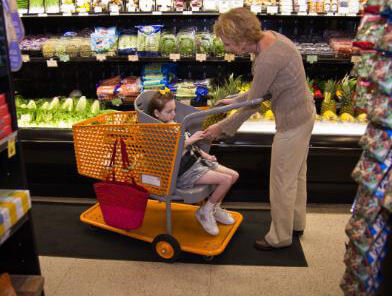Caroline's Cart: Grocery Cart for Special Needs Children
Author: Ian C. Langtree - Writer/Editor for Disabled World (DW)
Published: 2011/07/18 - Updated: 2023/09/14
Publication Type: Product Release / Update
Category Topic: Assistive Technology - Related Publications
Page Content: Synopsis - Introduction - Main
Synopsis: Parents and caregivers of special needs children to have access to a grocery cart specifically designed for challenges faced when shopping. When daughter Caroline was born with multiple disabilities. Drew Ann discovered that as Caroline got older, it became harder to place her into a traditional grocery cart and nearly impossible to maneuver a cart and her wheelchair.
Introduction
Parents and caregivers of special needs children who want or need to include their child in the shopping experience will soon have access to a grocery cart specifically designed for the unique challenges they face when shopping.
Main Content
Caroline's Cart was invented by Drew Ann Long, a stay-at-home Mom from Alabaster, Alabama, when she could no longer fit her special needs daughter Caroline into the traditional grocery cart provided by stores where she shopped.
The first shopping cart ever designed specifically for special needs children, Caroline's Cart will be available for purchase by grocers, home improvement and general merchandise retailers in the U.S. by 4th Q 2011.

Drew Ann and David Long's journey began in 2000 when daughter Caroline was born with multiple disabilities. Drew Ann discovered that as Caroline got older, it became harder to place her into a traditional grocery cart and nearly impossible to maneuver a cart and her wheelchair.
"I was frustrated," said Drew Ann. "Parents have access to amusement carts designed to look like miniature cars, and people with limited mobility can drive through the store in a motorized cart with wheels. However, as a mom who has to shop several times a week to provide food for my family, I had no way to shop with my disabled child - it was ludicrous."
Drew Ann's frustration turned to innovation in 2008, when she sketched out the cart she imagined and began searching the internet to learn about grocery cart manufacturers. She identified Indesign, an engineering design firm in Indianapolis, IN, to develop the cart prototype and retained legal counsel to file a patent.
The Longs were encouraged when Easter Seals in Chicago saw the cart.
"Caroline's Cart will be welcomed by thousands of families who have children with disabilities," said Sara Brewster Vice President, Marketing Communications for national Easter Seals, Inc. "This shopping cart will make it possible for kids with disabilities to be part of a family shopping outing. More than this, when families use Caroline's Cart in neighborhood stores, it sends an important message to everyone who sees them that kids with disabilities are kids first and need to be included."
"Our goal is to enable special needs children to more easily be included in their family's every-day life by making Caroline's Cart available at retailers across the country," said Drew Ann. "David and I made a commitment that this cart was going to happen - parents and caregivers of disabled children should have access to this. It is the right thing to do."
UPDATE - July 15 2013
Technibilt, member of the Wanzl Group, the world's largest producer of grocery carts, will start production on a line of Caroline's Carts on August 1.
As the word has spread in the special-needs community and selected stores have tried a prototype, Caroline's Cart's has won people over. David Orfinik, the vice president of sales and marketing for Technibilt, is convinced that the cart is essential supermarket equipment.
"Technibilt is thrilled to be a part of this amazing grocery cart for children with disabilities. It is going to provide families the opportunity to shop with their child with a disability, with the same ease as a typical child. We thank Caroline's mother and inventor of Caroline's Cart, Drew Ann Long, for recognizing this need and having the strength and fortitude to make it come to fruition. We feel that retailers and grocers world-wide will embrace this opportunity with open arms," Orfinik said.
Caroline's Cart innovative contribution to special-needs individuals has already been honored, most notably with the prestigious 2013 Da Vinci Award for Transportation and Mobility. In 2012, Caroline was named a National Youth Ambassador for Easter Seals, an opportunity that gave a greater platform for her story and the cart that bears her name. Easter Seals is so enthusiastic about the cart that it will be the first product emblazoned with the organization's iconic lily logo.
Michael Garry, a columnist for "Supermarket News," offered an decisive endorsement of Caroline's Cart in a January column:
"While I don't normally plug products - whether for-sale or store equipment like this shopping cart - I will make an exception here," Garry wrote of Caroline's Cart. "Every store should offer at least one."
Game Changer: The Remarkable Story of Caroline's Cart
 Author Credentials: Ian is the founder and Editor-in-Chief of Disabled World, a leading resource for news and information on disability issues. With a global perspective shaped by years of travel and lived experience, Ian is a committed proponent of the Social Model of Disability-a transformative framework developed by disabled activists in the 1970s that emphasizes dismantling societal barriers rather than focusing solely on individual impairments. His work reflects a deep commitment to disability rights, accessibility, and social inclusion. To learn more about Ian's background, expertise, and accomplishments, visit his full biography.
Author Credentials: Ian is the founder and Editor-in-Chief of Disabled World, a leading resource for news and information on disability issues. With a global perspective shaped by years of travel and lived experience, Ian is a committed proponent of the Social Model of Disability-a transformative framework developed by disabled activists in the 1970s that emphasizes dismantling societal barriers rather than focusing solely on individual impairments. His work reflects a deep commitment to disability rights, accessibility, and social inclusion. To learn more about Ian's background, expertise, and accomplishments, visit his full biography.